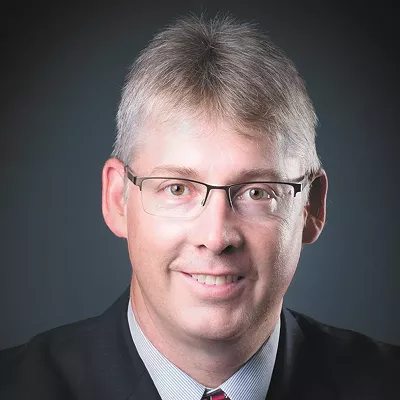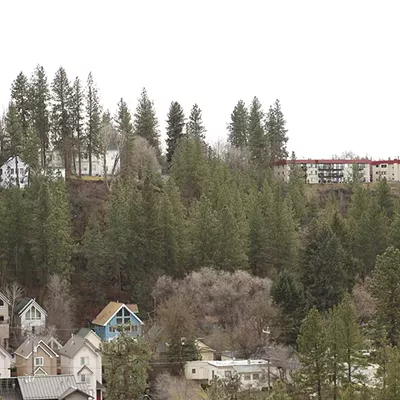Smith and the newspaper have engaged the Washington News Council to oversee a review of all their River Park Square coverage to determine whether their journalism was sound. Specifically, was the newspaper used as a tool to further the business interests of their owners?
Editor & amp; Publisher, the newspaper industry's insider magazine, calls the audit "commendable," but here in Spokane, it may be too late: Most people made up their minds on the subject a long time ago.
Still, people should trust the effort as an impartial last word on the matter. The WNC is a fine organization, and it has tapped some impressive talent to conduct the review. (The Review is paying $15,000 for the audit; the WNC expects to match that amount.) Bill Richards, a journalist with 40 years experience at places like the Wall Street Journal, the Washington Post and the Seattle Post-Intelligencer, will double-check all those acres of newsprint. And Cliff Rowe, a journalism ethics expert and professor at Pacific Lutheran University, along with Chuck Nordoff, a former aide to Sen. Slade Gorton and holder of an MBA from Harvard, will act as Richards' editors.
& lt;span class= & quot;dropcap & quot; & B & lt;/span & ut why rip open that old civic wound now that it's finally started to heal? The River Park Square controversy exploded into a decade-long political civil war that pitted Spokane's old guard against self-described reformers. Why did it turn into such a massive upheaval? Yes, citizens were forced to pay for a new parking garage (perhaps the most expensive parking garage ever built), but as public rip-offs go, this was relatively modest. Not one but two Seattle stadiums, Enron, the Medicare drug benefit, Halliburton, subsidies for oil companies -- now those are rip-offs. At least Spokane got a new mall out of the deal.
We Americans are pretty used to being taken advantage of, but this was something more. Perhaps a century of feeling pressed under somebody's thumb bubbled into open revolt. As the reality of the mall deal became clear, locals thought the newspaper should have known and should have told them the truth. People lost their trust.
"And trust," Richards told me this week, "is what it's all about. Clearly there seems to be a cloud that just doesn't go away about this whole conflict."
And that cloud keeps on raining doubts. When the Jim West story broke, some couldn't help but wonder whether the Review held the story for so long because they were waiting until the ink was dry on all the River Park Square settlements. And when the story of the auto accident at the RPS parking garage broke, and it languished for days, it seemed like another case of the paper ignoring the foibles of the owners' properties. (By comparison, the falling tile that caused a fatality in the Big Dig tunnel in Boston was front-page news back east for weeks.)
So it's no surprise that Smith and the Review want to replace this gloomy outlook with sunnier skies. Maybe this audit will help clear the air, but I think the lost trust is something that will need to be won back one story at a time, day by day, month by month. It's like marriage counseling: Even if your spouse finally admits he was wrong, it still takes time to forgive him. But it's a start.
& lt;span class= & quot;dropcap & quot; & T & lt;/span & he whole process will take about another six months; at the end, the Review will publish Richards' report as is. That's a good plan, but $30,000 does seem like a lot of money. Since The Inlander is a free paper, I'll give you the short version of what happened at no extra charge.
Did the Review really fail to warn citizens? It's true the paper could have dug deeper and listened more openly to critics, but in January 1997, the deal was pretty hard to understand. In fact, the report commissioned by the City Council, which detailed all the deal's fatal flaws, was not shared with reporters until a couple hours before the meeting in which the city formally joined the project. And after the city voted to join the project, all the controversy that ensued was mere talk: The city and its taxpayers were legally on the hook from that day forward.
So reporters were kept in the dark on purpose -- by city officials and the very family that has stood for truth all these years -- but that doesn't mean the editors had to fall in line so blindly. Yet as they have done before (opposing the Grand Coulee Dam, endorsing George W. Bush), the Review's opinion arm got squarely on the wrong side of the issue. The critics (one was even labeled a "civic terrorist" by Review Editor and soon-to-be official RPS scapegoat Chris Peck) turned out to be right, even though their grievances often seemed to be more a case of Cowles-hating than anything else. The proponents turned out to be wrong about the garage being able to pay its own way, even though they were right that the mall would help save downtown Spokane.
It should come as no surprise that newspapers -- especially in their opinion pages -- tend to reflect the views of their owners. But it's also a fact that if readers sense deception, even remotely, they will become skeptical, then cynical, then just tune out. That's the cost of even the whiff of betraying the public trust for private gain. And that's been the Cowles' penance.
But were journalistic crimes committed? Were stories changed in the editing process to better reflect the financial goals of the owners? If Richards can answer those questions, he will earn his pay.
Will any of it matter? All this may mean something inside the Review's red tower and perhaps even in the larger world of journalism, but most people here either trust 'em or they don't.



















